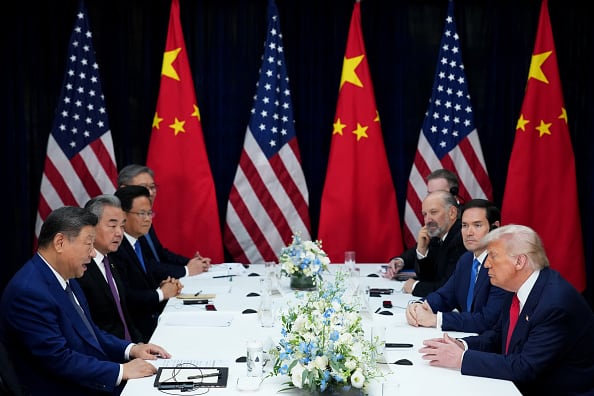

Average tariff drop on China exports to 47%, lower than previous Trump threats but still higher than 2024
Thomson Reuters
U.S. President Donald Trump said on Thursday he had agreed with President Xi Jinping to trim tariffs on China in exchange for Beijing cracking down on the illicit fentanyl trade, resuming U.S. soybean purchases and keeping rare earths exports flowing.
Trump's face-to-face talks with Xi in the South Korean city of Busan, their first since 2019, marked the finale of the U.S. president's whirlwind Asia trip on which he also touted trade breakthroughs with South Korea, Japan and Southeast Asian nations.
"I thought it was an amazing meeting," Trump told reporters aboard Air Force One shortly after he departed Busan, ranking the talks a "12 out of 10."
Trump said tariffs imposed on Chinese imports would be cut to 47 per cent from 57 per cent by halving the rate of tariffs related to trade in fentanyl precursor drugs to 10 per cent from 20 per cent.
Xi will work "very hard to stop the flow" of fentanyl, a deadly synthetic opioid that is the leading cause of American overdose deaths, Trump said. The tariff was reduced "because I believe they are really taking strong action," he added.
Previous truces short-lived
While Trump heralded the drop, only India and Brazil are still subject to higher tariff rates among major U.S. trading partners.
Xi urged further co-operation in comments carried by Chinese state media after the meeting. China's Commerce Ministry later said it would pause some countermeasures for a year.
World stock markets from Wall Street to Tokyo had hit record highs leading up to the meeting on hopes of a breakthrough in a trade war between the world's two largest economies that has upended supply chains and rocked global business confidence.
But equity markets fell Thursday ahead of Wall Street's opening on concerns the truce may prove fleeting. Previous trade negotiations have seen promising starts followed by setbacks.

A rapid-fire shots of tariffs and import curbs this year hearkened back to Trump’s first term in office when the U.S. and China engaged in a trade war and a series of retaliatory tariffs. President Joe Biden, in office between Trump's two terms, retained many of the U.S. tariffs directed at Beijing.
When Biden left office, U.S. tariffs on China averaged around 20 per cent. The tariff rates have been volatile since, with Trump in April announcing plans to jack the rate on Chinese goods to 145 per cent, only to abandon those plans as markets recoiled.
Then, on Oct. 10, Trump threatened a 100 per cent import tax because of China's rare earth restrictions.
Beijing seeks easing of U.S. export controls
The cordial meeting, which took place on the sidelines of the Asia-Pacific Economic Cooperation (APEC) summit, lasted nearly two hours.
Trump repeatedly talked up the prospect of reaching agreement with Xi since U.S. negotiators on Sunday said they had agreed a framework with China on tariffs and a deferral of China's export curbs on rare earths, a sector it dominates.
But with both countries increasingly willing to play hardball over areas of economic and geopolitical competition, many questions remain about how long any trade detente may last.
As they sat down to begin talks at a South Korean airbase on Thursday morning, Xi told Trump via a translator it was normal for the superpowers to have frictions now and then.
A few days ago, trade negotiators for both countries reached a "fundamental consensus on addressing each other's primary concerns," Xi said.
"I am willing to continue working with President Trump to lay a solid foundation for China-U.S. relations," he added.
WATCH | Canada must adjust to new U.S. approach: Bank of Canada governor:
As well as trimming the fentanyl tariffs, Beijing had sought an easing of export controls on sensitive U.S. technology, and a rollback of new U.S. port fees on Chinese vessels aimed at combating China's global dominance in shipbuilding, ocean freight and logistics.
Trump made no immediate comment on U.S. concessions but said China would purchase "tremendous amounts" of U.S. soybeans and other farm products "starting immediately."
Ahead of the summit, China bought its first cargoes of U.S. soybeans in several months, Reuters reported exclusively on Wednesday.
Previous trade deals, which brought down retaliatory tariffs on the U.S. side and restarted the flow of rare earth magnets from China, are due to expire on Nov. 10.
But Beijing dramatically expanded its controls on rare earths earlier this month, minerals used in everything from cars to fighter jets on which they have a global stranglehold.
"They're not going to impose the rare earth controls," Trump told reporters.
WATCH | U.S. playing massive 'catch up' game on rare earths:
Trump signed various pacts with Japan and Southeast Asian nations on diversifying supplies of rare earths during his trip, though blunting China's dominance in that area may take years.
The leaders did not discuss chipmaker Nvidia's state-of-art Blackwell artificial intelligence chip, Trump said, walking back the previous day's remarks about potentially helping the company to export a scaled-down version of its current flagship GPU processor, a key component in the AI race.
U.S. Treasury Secretary Scott Bessent said on Thursday that China has agreed to buy 12 million metric tonnes of American soybeans during the current season through January and has committed to buying 25 million tonnes annually for the next three years.
Bessent told Fox Business Network that other countries in Southeast Asia have agreed to buy another 19 million tonnes of U.S. soybeans but did not specify a timeframe for those purchases.
With files from the Associated Press